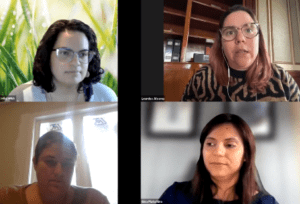Who is a member?
Our members are the local governments of Massachusetts and their elected and appointed leadership.

The MMA co-hosted a webinar with Health Resources in Action to review best practices for engaging residents in municipal decision-making processes. Pictured are (clockwise from top left) Cynthia Espinosa Marrero, HRiA senior manager of health and racial equity, Lourdes Alvarez, Chelsea’s communication and community outreach manager, Casey Burns, Worcester Together Coalition and Gina Plata-Nino, Worcester Together Coalition.
The MMA today co-hosted a webinar with Health Resources in Action to review best practices for engaging residents in municipal decision-making processes.
Ben Wood, senior director of policy and practice for Health Resources in Action, began by reviewing the “spectrum of engagement” and describing community involvement, impact, trust and communication along a continuum. Ideally, Wood explained, resident engagement begins with outreach and evolves to a strong bidirectional relationship where municipal decisions are made at the community level and strong partnerships are formed.
When approaching resident engagement, municipalities are advised to consider how to promote transparency in their efforts, sustain authentic and diverse engagement, and strengthen municipal capacity to correct power imbalances.
Wood reviewed actions municipalities have taken to build trust and address power discrepancies across the Commonwealth, highlighting the creation of interactive dashboards and allocation of funds for community-led decisions.
Cynthia Espinosa Marrero, senior manager of health and racial equity at Health Resources in Action, facilitated a discussion with panelists to showcase successful community engagement initiatives in Chelsea and Worcester.
Gina Plata-Nino and Casey Burns, members of the Worcester Together Coalition, and Lourdes Alvarez, Chelsea’s communication and community outreach manager, discussed creative ways that local officials can use to engage residents who have been historically excluded from municipal decision-making processes. Panelists emphasized the importance of governing with intention, building trust for long-term relationships, and prioritizing engagement, rather than making it a “check-the-box” item.
Marrero facilitated a question and answer session, which included questions about tools for broadly reaching constituents, the importance of engaging persons with disabilities, and methods for compensating residents for participating in community-sponsored activities.
Wood closed the session by reviewing key takeaways for investing in community engagement and kickstarting outreach.
• Resident Engagement in Municipal Processes presentation (500K PDF)